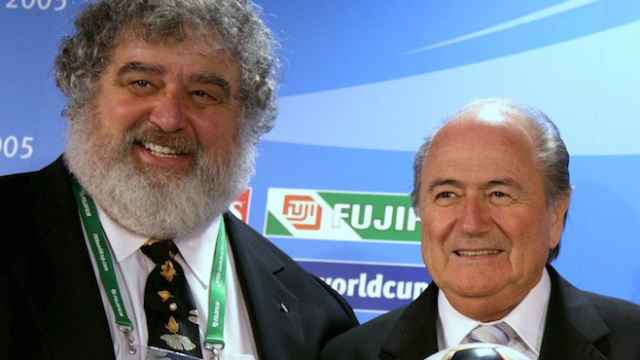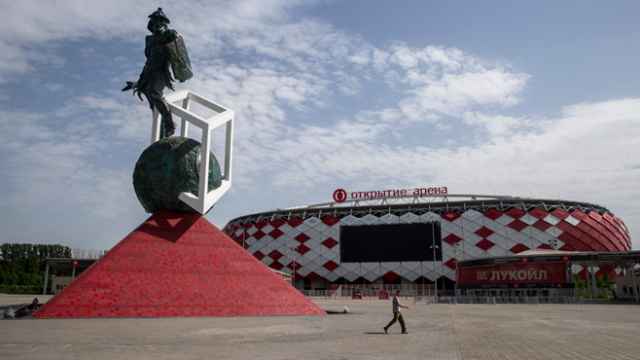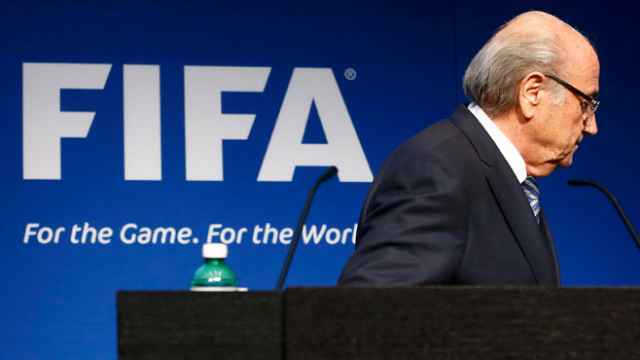President Vladimir Putin is still likely to host the World Cup in 2018 despite an FBI investigation into Russia's winning bid but his hopes of staging a tournament that impresses his critics are fading.
Not only is the event mired in scandal because of corruption allegations hanging over FIFA, soccer's governing body, but the Russian government is being forced by an economic crisis to trim spending on its preparations.
Putin will do all he can to ensure the finals are not taken away from Russia — and to boost his own image as well as his country's — especially as a presidential election is due in 2018. But even he has been forced to lower his sights.
"The economic downturn has greatly dented [Russia's ambitions]," said Chris Weafer, senior partner at consulting firm Macro Advisory. "Even before the FIFA scandal, there was a scaling back of the original elaborate plans."
Russia won the right to host the finals in 2010 with a bid promising to overhaul the transport system, build state-of-the-art sport facilities and put several regional cities on the map.
It expects to spend more than 660 billion rubles ($12 billion) on preparations including building six new stadiums, hotels, training grounds and health facilities.
Costly airport renovations and high-speed rail links are also needed to ease travel between the 11 host cities, the most distant of which, Yekaterinburg, is almost 2,000 kilometers (1,250 miles) from Moscow.
But the economy has been hit by Western economic sanctions over Russia's role in the Ukraine crisis, a fall in the price of oil — the country's main export commodity — and the ruble's sharp decline against the U.S. dollar in the past year.
Last week the government reduced planned spending on the World Cup by 3.5 billion rubles, the latest in a series of cuts made as the economy flags.
Since the start of 2015, the World Cup organizers have axed plans to build 25 hotels, cut the number of training grounds in each host city from four to three and reduced the capacity of some of the venues to save on building costs.
Moscow's Luzhniki stadium, which will stage the opening match and the final a month later, will be able to seat 81,000, down from the 89,000 originally billed.
"This World Cup is an image project for Putin. He really has something to prove here," a source close to the organizing committee said.
But he added: "The approach to this World Cup now is to do what was promised, with no frills, and nothing more."
Michal Karas, editor-in-chief of the Stadium Database website, said many high-tech features included in designs for Russia's new stadiums have been scrapped as the weak ruble made imports more expensive.
"The biggest issue is ordering materials from abroad," he said. "But the stadiums were designed by Western companies so in most cases they need advanced materials from Europe."
Building materials are now being sourced locally from Russian providers because of the ruble's decline, which Sports Minister Vitaly Mutko said could push up construction costs by 30-40 percent.
Despite the cuts, stadium construction is largely on track and officials expect to meet FIFA's deadline for hosting another international tournament, the Confederations Cup, in mid-2017.
Of the stadiums being built or updated, three are already complete and work has begun at eight more. Builders are due to break ground at the last one, in the Russian exclave of Kaliningrad on the Baltic Sea, in July.
"A more disturbing issue is the price tag," said Karas, adding that there were concerns that corruption could inflate costs by as much as 50 percent.
The Winter Olympics in Sochi last year put the spotlight on Russia's problems with corruption and cronyism, as well as the Kremlin's record on democracy and human rights, prompting many Western leaders to skip the event.
The estimated cost of the Sochi games soared above $50 billion, much more than had been planned. Such costs would be harder for the Russian economy to withstand now — the Sochi Games were held before the Ukraine crisis and the economic downturn.
The resignation of Sepp Blatter as FIFA president this week deprived Moscow of a potentially vital ally if pressure grows for Russia to be stripped of the World Cup.
But Russia has denied wrongdoing in its bid and is not widely expected to lose the right to host the finals, despite investigations by both the FBI and Swiss prosecutors.
"There is no risk to Russia hosting the World Cup," Mutko was quoted as saying by Russia's RIA Novosti news agency.
Putin has said nothing in public about this week's moves, though he defended Blatter after he was re-elected for a fifth term as FIFA chief last week and accused the United States of meddling outside its jurisdiction.
Russian officials are portraying things as business as usual with FIFA and say the World Cup preparations continue apace. Experts say a World Cup boycott by other nations is unlikely.
A Message from The Moscow Times:
Dear readers,
We are facing unprecedented challenges. Russia's Prosecutor General's Office has designated The Moscow Times as an "undesirable" organization, criminalizing our work and putting our staff at risk of prosecution. This follows our earlier unjust labeling as a "foreign agent."
These actions are direct attempts to silence independent journalism in Russia. The authorities claim our work "discredits the decisions of the Russian leadership." We see things differently: we strive to provide accurate, unbiased reporting on Russia.
We, the journalists of The Moscow Times, refuse to be silenced. But to continue our work, we need your help.
Your support, no matter how small, makes a world of difference. If you can, please support us monthly starting from just $2. It's quick to set up, and every contribution makes a significant impact.
By supporting The Moscow Times, you're defending open, independent journalism in the face of repression. Thank you for standing with us.
Remind me later.





